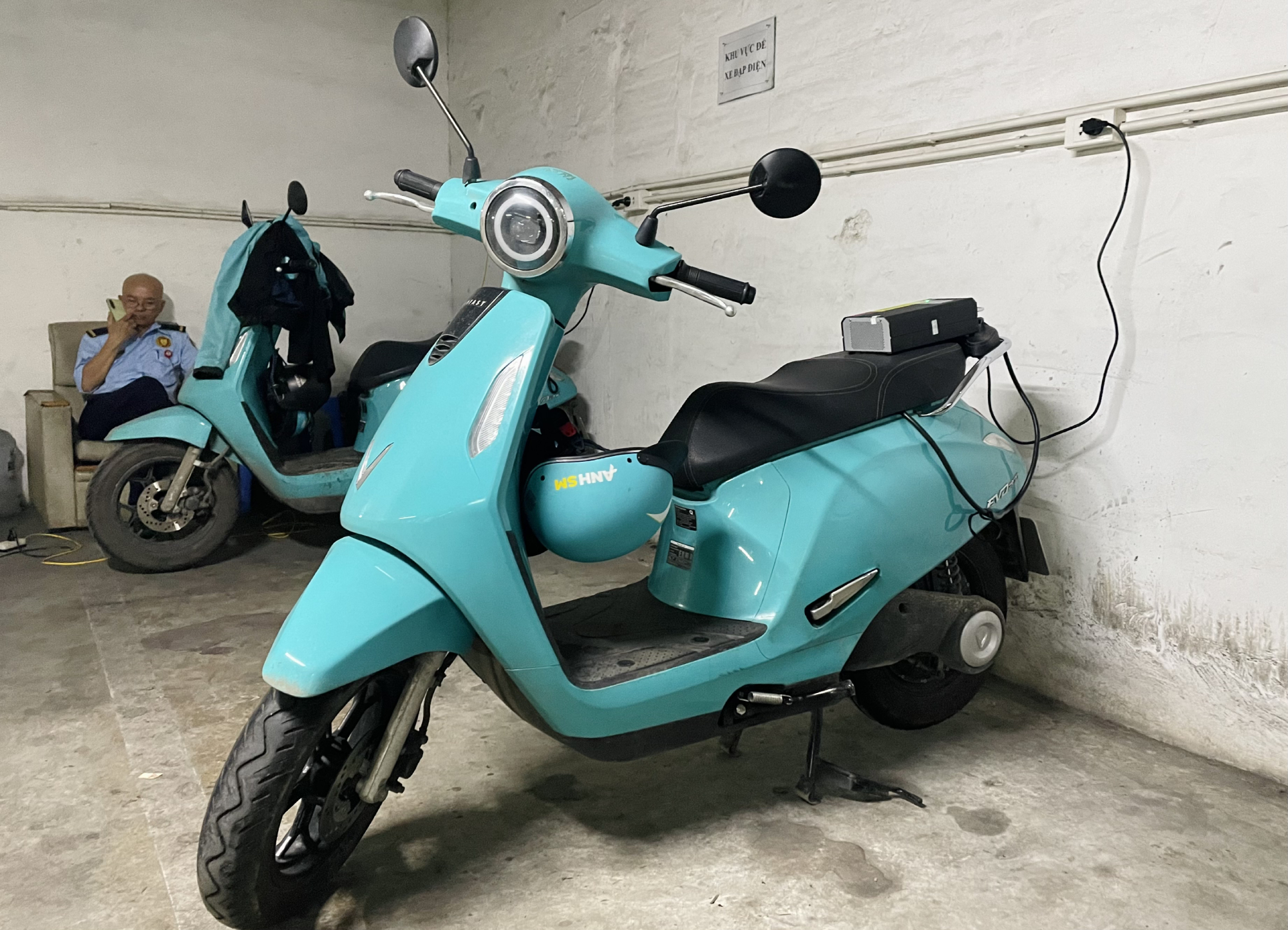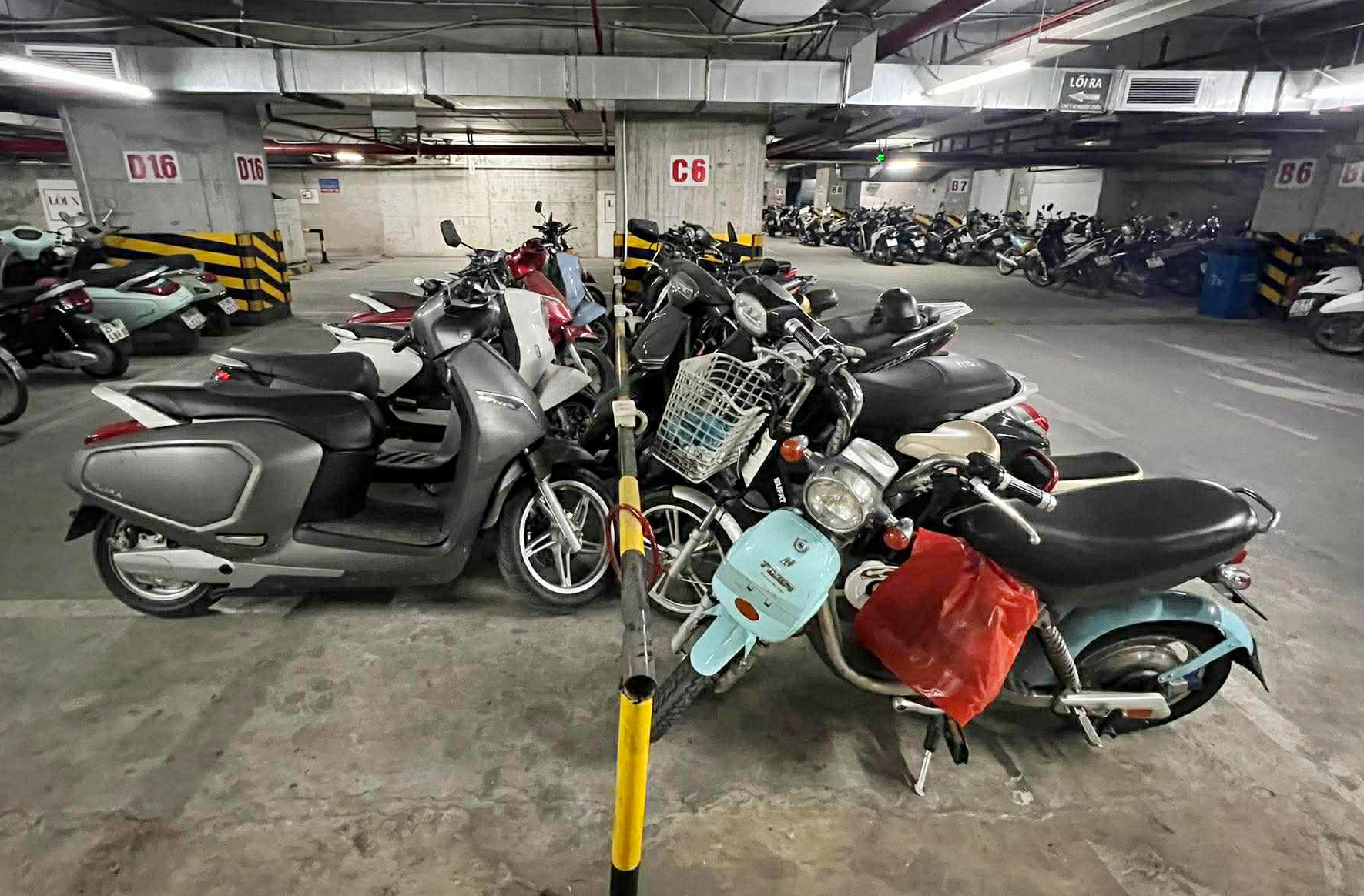"But after a year, I had to sell it. There was nothing wrong with the scooter itself, but the stigma associated with riding one was too much," Quynh, 30, from Hanoi, shared.
The issue began in the latter half of 2023, following a series of fires in mini-apartments in Hanoi. Fear of electric scooters escalated, and despite investigations concluding that the cause was an electrical short in a gasoline-powered vehicle, many remained skeptical and blamed electric scooters. Consequently, parking lots across the city designated separate areas for electric scooters and implemented charging time restrictions for safety.
Many landlords refused tenants with electric scooters or prohibited charging. Numerous riders were left uncertain about where to park and charge their vehicles.
Quynh's landlord was no different. Her scooter required overnight charging, but someone, often the landlord, would unplug it. Many mornings, she found her scooter without power, disrupting her work. After repeated insinuations that her scooter was a fire hazard, she was eventually evicted.
Finding new accommodation proved arduous. "Landlords would shake their heads at the mention of an electric scooter," Quynh recounted. Old apartment complexes lacked secure parking, while public lots often lacked covered areas and safe charging stations.
After two months of searching, Quynh found a room in Thanh Xuan district, 8 km from her workplace. Even there, charging her scooter felt clandestine due to the scrutiny.
"Whenever I brought my scooter out, people would react with worry and avoid me like I was a Covid patient," she said. Overwhelmed by the constant hassle, she sold the scooter.
 |
An apartment building in Dong Ngac ward, Hanoi, designates a separate parking area for electric scooters and bicycles near the security area, with dedicated attendants. Photo: Phan Duong |
An apartment building in Dong Ngac ward, Hanoi, designates a separate parking area for electric scooters and bicycles near the security area, with dedicated attendants. Photo: Phan Duong
Minh, 27, a resident of an apartment building in Vinh Tuy ward for two years and an electric scooter user, said her building has a designated charging area with power cut-off after 11 p.m. for safety. With limited outlets and a growing number of scooters, each requiring 6-8 hours of charge, her scooter was frequently unplugged by others.
"The most inconvenient aspect is the charging area's location near the security booth. Reaching it from my apartment involves crossing two buildings, a 300-meter trek. Mornings are hectic, especially with a baby in one arm and belongings in the other," she explained.
On social media, many electric scooter users share similar experiences. A discussion thread titled "The Most Annoying Things About Using Electric Scooters" on a vehicle forum on 22/7 garnered hundreds of comments describing discrimination from security guards at buildings and shopping malls, being called "stupid" for choosing electric scooters, and facing disapproval in cafes. Some users reported their scooters being moved from shaded parking spots to direct sunlight at supermarkets, while others were denied parking in their own apartment buildings.
Beyond personal feelings, many face real restrictions on using these vehicles. A survey of 2,500 VnExpress readers revealed that 48% felt stigmatized for riding electric scooters, with 42% encountering charging difficulties and 6% being refused parking.
This apprehension also discourages potential buyers. Another survey of nearly 13,000 readers indicated that if gasoline-powered motorcycles were banned, only 24% would consider switching to electric scooters. Most would prefer public transport (34%) or ride-hailing services (29%).
Fear of fires is the primary reason for the stigma. Le Hung, the owner of a five-story apartment building in Cau Giay district, stopped accepting tenants with electric scooters nearly two years ago. "I know it's unfair to them, but it's better to be safe than sorry. The electrical system here is old, and I can't afford any accidents," he said.
 |
Minh's apartment complex in Vinh Tuy ward, Hanoi, has a designated electric scooter area with a daily power cut-off at 11 p.m.. Photo: Provided by the interviewee |
Minh's apartment complex in Vinh Tuy ward, Hanoi, has a designated electric scooter area with a daily power cut-off at 11 p.m.. Photo: Provided by the interviewee
Associate Professor Do Van Dung, vice president of the Ho Chi Minh City Automotive-Mechanical Engineering Association, acknowledges the "electric scooter stigma" as a current reality, especially as the government promotes clean vehicles in urban areas while infrastructure and public awareness lag behind.
"The apprehension is not unfounded. It stems from concerns about fires, lack of charging facilities, and the feeling of being 'forced' to switch without adequate support," Dung said.
According to Dung, the limited charging infrastructure creates range anxiety among users, even for daily commutes of 20-50 km. Long charging times and battery costs, which account for 40-60% of the scooter's price, make them more expensive than comparable gasoline-powered models.
Electric scooter charging is banned in many apartment buildings, with restrictions tightening after fires related to low-quality electric scooters in 2023-2024.
"Lithium-ion batteries, commonly used in electric scooters, can ignite if short-circuited, improperly charged, or exposed to water. While statistics show a fire risk about 10 times lower than gasoline-powered vehicles, concerns persist due to the difficulty of extinguishing these fires," the expert explained.
Tran Thien, a motorcycle repair instructor with over 30 years of experience and 16 years working with electric scooters in Dong Nai, shares this view, citing fire risk as the main concern. He admits electric scooter fires are difficult to extinguish but asserts that most incidents result from modifications, unauthorized accessories, improper charging, or the use of counterfeit, manually assembled products lacking safety certifications.
"The fear is amplified by apprehension towards new technology. Gasoline-powered vehicles catch fire regularly, but their familiarity makes these incidents less noticeable. Electric scooters, being relatively new, are immediately blamed when fires occur," he reasoned.
From a broader perspective, Associate Professor Dung views this as a necessary transition phase. "Electric vehicles in urban areas reduce emissions and noise pollution, suitable for densely populated cities like Hanoi and Ho Chi Minh City. As electric scooters replace gasoline-powered ones, pollution will undoubtedly decrease," he stated.
To facilitate this transition, he recommends integrated charging stations in apartment building basements: slow (AC) charging points with 3-7kW capacity, combined with smart management systems via apps for scheduling and payment.
Manufacturers should use LFP (Lithium Iron Phosphate) batteries instead of standard lithium-ion, due to their higher safety and longer lifespan of 20,000 cycles. Batteries should be designed with fire-resistant insulation and integrated thermal cut-off sensors. Users should use original chargers, avoid overnight charging without automatic shut-off, and have regular check-ups at specialized garages.
Dung also warns that by 2050, Vietnam could face millions of expired electric scooter batteries. Without proper disposal policies, this poses a significant environmental risk due to heavy metals and high recycling costs. Repurposing used batteries (second-life) for solar energy storage before full recycling is a viable option.
While the government offers subsidies of 3-5 million VND per vehicle and tax exemptions, the current implementation lacks a concrete roadmap, creating practical conflicts.
"On one hand, there's the environmental goal, and on the other, people's daily lives. Without a comprehensive solution, this stigma will become the biggest obstacle to the transition," Associate Professor Dung emphasized.
Quynh Duong












